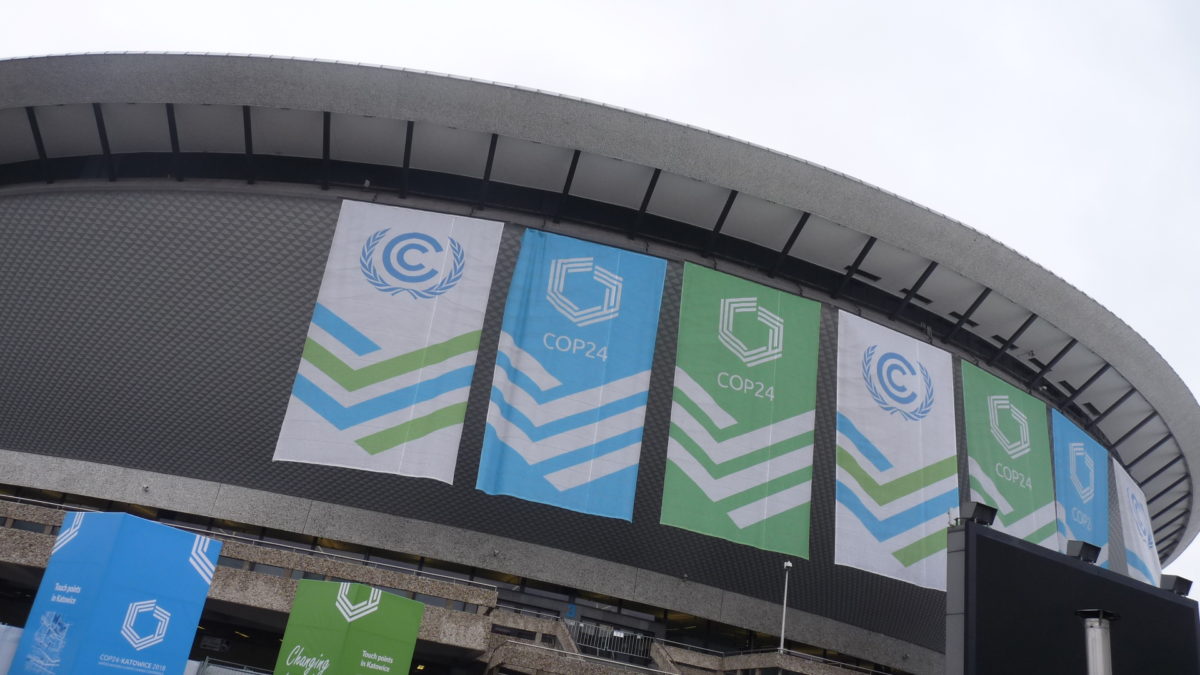That’s all folks
I'm signing off for today because I found myself suffering COP Dissociation Syndrome before arriving in the India pavilion, it’s a condition that involves reeling in a loop between the Chinese session on bamboo and rattan, the Pacific islands’ set on agreeing agricultural emissions recording and the Senegal display, to scoop up a handful of free peanuts.
Fortunately a shot of free Austrian coffee (and a purloined biscuit) brought me back to my senses.
I’m off back to Bytom now, where I will try not to dwell on what Al Gore graphically pointed out we are all doing to the planet. Let’s not lose hope though, eh? Until tomorrow…
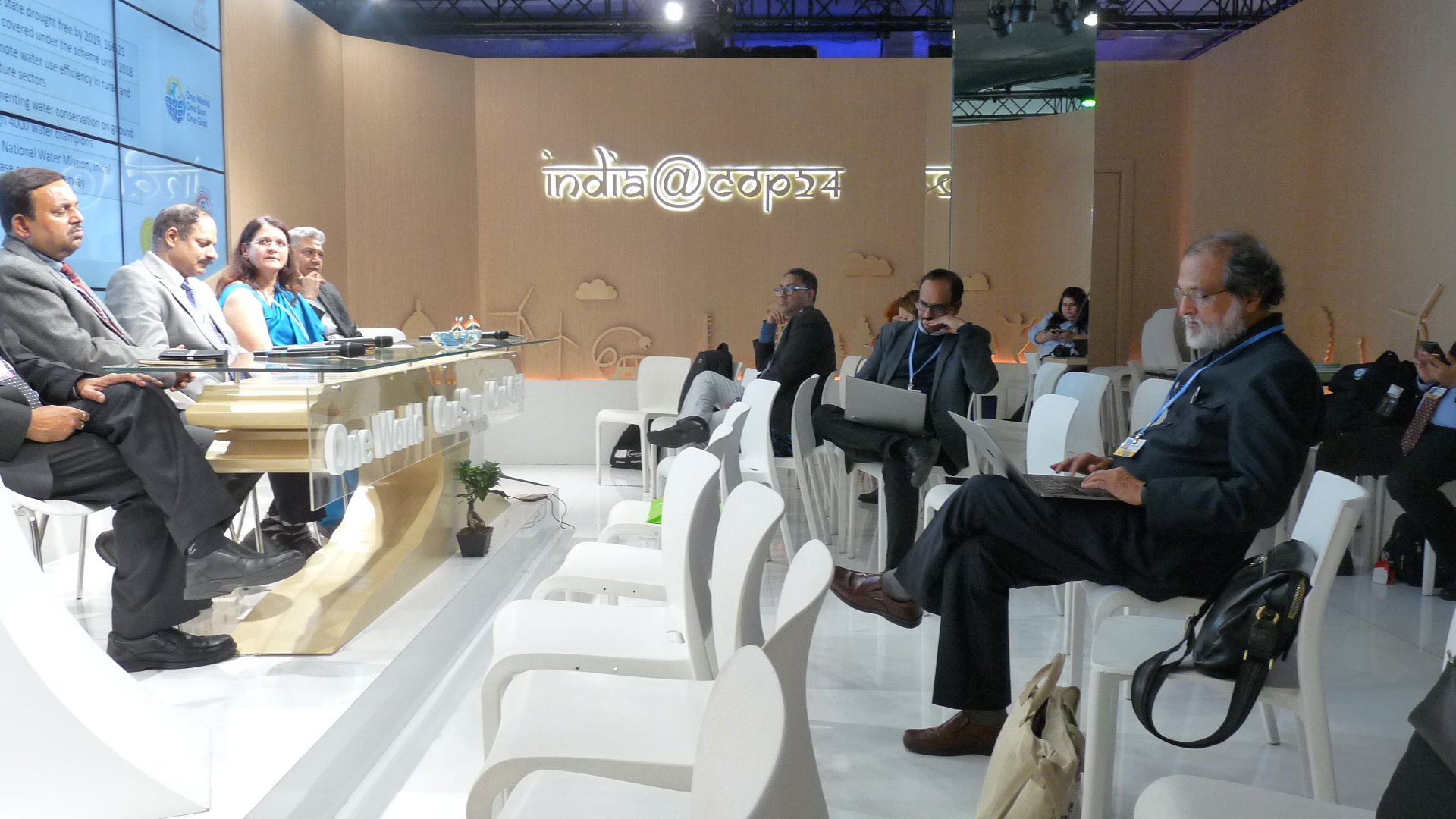
Policy fails to draw the crowds
I've ended up in the Indian pavilion and am listening to Naman Gupta, from Maharashtra, who is discussing the state’s crackdown on styrofoam and other plastics as well as its research into climate resistant crops.
What is noticeable is that there are so few people present for what is a discussion about climate change mitigation policies when the area has previously been packed out for solar-related discussions.
In fact, as I’m typing this (the beauty of live blogging), one of the few delegates present has demanded to know from the panel the reasons why this session is so poorly attended. And he has offered in evidence that he has walked around and seen lots of less important sessions (a little harsh, that) which are better attended. Maybe I’ll chip and offer a defense on behalf of the panel.
What it may tell us, in all seriousness, is the successful business model solar offers in India, enough to draw a variety of delegates from a cross-section of sectors and interest groups, and despite the fact there is no visible daily agenda anywhere around the exterior of this pavilion.
Sadly, there is no such compelling business case for worthy, climate-related policies – or at least not one that appears directly bankable.
People have the power
I’ve ambled over to the EU pavilion where a somewhat abstract blue-sky discussion is going on about taking different approaches to decarbonization.
The irony has not been lost on the panel that they are discussing how to influence, or ‘nudge’ in today’s parlance, people into more eco-friendly lifestyle choices whilst sat in an area that is to terrifically hot they’ve got two electric fans going full tilt. Physicist John Schellnhuber, who is chairing the panel, referred to it and suggested, as an example, we should maybe all be sitting here in our swimsuits – it’s a fair point, but one that usually results in a complaint to HR.
On a more serious point though, he extolled the importance of taking a whole-region approach to issues such as closing coal mines, what he refers to as ‘creating a whole new narrative’.
He says: “If we shut down the coal mines, 8,000 people will go out of work and the obvious response is, ‘we will buy them off, and offer them big pensions’. But then you find there is a chemical industry with it, there is a whole supply chain that is closed down. What you end up with is social unrest and votes for right-wing extremists.”
It is an approach that was endorsed by Deputy Director-General of the European Commission, Patrick Child, who refers to the region-wide approach to such problems as “so-called superlabs”, as promises there is more to come from the EU.
The panel was discussing a new report called People Have The Power which illustrates, a) the EU is trying to focus on a citizen first, bottom-up approach; and b) that someone, somewhere in the EC loves Patti Smith.
I'm going to decamp now before I faint – it is rather stuffy in here.
Upping the stakes
And UN Secretary-General António Guterres has reportedly raised the stakes within the last hour at the closing session of the high-level, ministerial talks on the Talanoa Dialogue.
Talanoa, for the uninitiated, is the process set in train by last year’s hosts Fiji, to get the world’s governments to put in place a method by which they will fulfill their 1.5C pledges, made in Paris three years ago.
Mr. Guterres told the assembled environment ministers, the Polish presidency of the talks had tabled a new basis for negotiations this morning, adding: “Over the last 10 days, many of you have worked long, hard hours and I acknowledge your efforts.
“But we need to accelerate those efforts to reach consensus if we want to follow-up on the commitments made in Paris.
“The Katowice package needs to deliver the Paris agreement work program, progress on finance and a strong and solid basis for the revision of national determined contributions under the Talanoa Dialogue.”
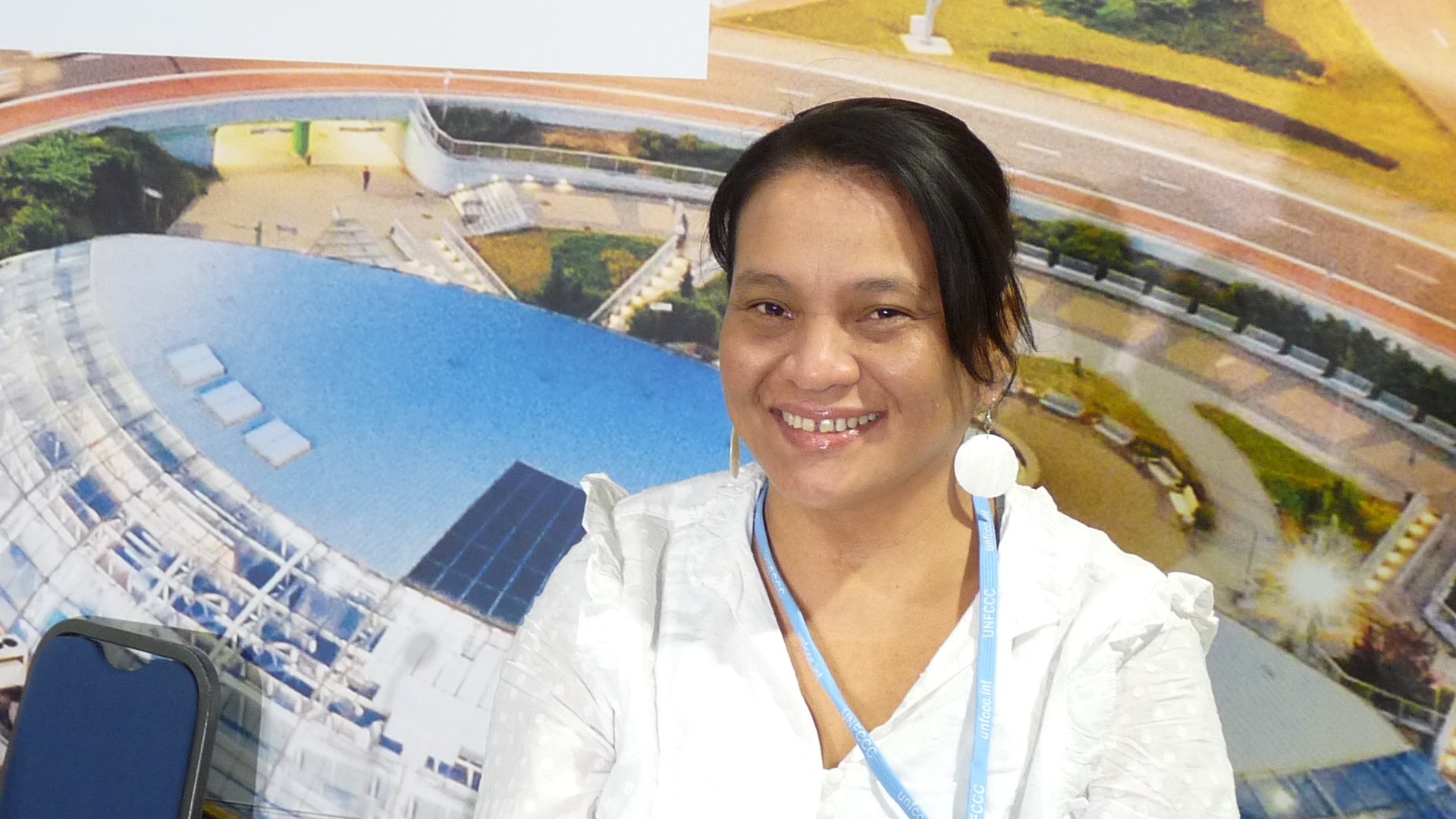
Refusing to accept defeat
The best laid plans eh? The requirements of writing up Al Gore’s address (and the demands of the lunch queue for cabbage soup) meant I was only able to catch the tail end of the solar cooking presentation.
There was talk of more than 3.2 million solar cookers worldwide, including those made by users themselves thanks to the educational work of Solar Cookers International. Another figure bandied about was 11.5 million people who are directly impacted by the devices.
The highlight, however, was the response by Angeline Heine – National Energy Planner for the Marshall Islands – when asked why combating climate change is important for her Pacific island state.
“First of all, I’d like to make a correction, it’s not when climate change will affect us, because it is impacting us right now,” said Ms Heine. “The Marshall Islands, it is a low-lying nation. We live on the ocean, we’re surrounded by the ocean.
“It’s not just sea level rising, we are experiencing things like the fishing seasons have changed as communities try to cope with skills passed down from generation to generation. For the fish, coral reefs are dying because waters are getting warm. We’re not really farmers, we’re seafarers, we’re fishermen.
“Your identity is your island, your culture is your island. And if the land disappears, who are you as a person? It’s hard to imagine who you are without having your home.
“That is why we are one of the islands that doesn’t include migration in our planning, we don’t even want to discuss migration – it’s offensive to us, it’s against our human rights.”
A moving address
Mr. Gore of course paid due credit to the advances made by solar in the optimistic final third of his powerful address.
He spelled out the scale of solar installations compared to predictions at the turn of the century, pointed out grid parity has been achieved in many nations and explained the levelized cost of electricity (LCOE) as ‘What does it cost to produce the energy?’
He went on to laud the INR2.44/kWh ($0.034) price floor reached for Indian solar, to highlight China’s contribution as the world’s leading light for PV and mentioned the Vatican’s plan to go carbon neutral, adding: “They have two advantages: they’re very small, and they have God on their side.”
He concluded his brief elegy to solar by adding: “You know the famous Coal Museum in Kentucky? It has just installed solar panels on its roof! Makes sense…”
The talk was an impressive show of rhetoric that saw the speaker repeatedly raise his voice to roar: “IS THAT OKAY?” after highlighting the horrors of what climate change means, such as the fact a child born in Katowice will breathe air that is the equivalent of smoking 1,000 cigarettes in its first year of life.
Mentioning the array of natural disasters occurring around the world since the Paris agreement three years ago – together with the part played by climate change in exacerbating such events and making more common such droughts, wildfires, floods, mudslides and record temperatures – he asked: “Are we going to let this become the new normal and not wake up?”
In making reference to the response made by the White House to Hurricane Marina in Puerto Rico last year, Mr. Gore described it as “a vivid example of environmental racism”.
And a powerful question came at the beginning of the speech, when Mr. Gore asked: “Will civilization descend into a new Dark Age?”
It was hard to escape the feeling that this eloquent advocate would be better served knocking the heads together of the politicians not far away but then, as stated below, maybe that is in the plan.
Gore on Trump
Gore, clearly one of star draws at Katowice, held off for a long time before mentioning Trump by name but when he did, it was worth the wait.
Gore had already mentioned “this damnable wave of populist authoritarianism in the whole world… even Brexit – the U.K. made a dumb mistake, let’s just say… now they’re trying to work out how to deal with their mistake”.
He went on to add: “For those of you attempting to deal with your feelings towards Donald J Trump and the administration he has, I understand. I want you to take note of what happened just five weeks ago. The election that took place in the U.S. was quite remarkable. It was the largest repudiation of a sitting president by voters in a mid term election in the history of the United States. It may well be an indication of things to come two years from now.”
I feel bound at this point, in the interests of objective journalism, to point out Mr. Gore’s decision to focus on the popular vote without mentioning Republicans holding the Senate is a selective approach that could easily be dismissed by the White House as fake news.
But, I was interrupting Mr. Gore in full flow, in front of a rapt audience and he went on: “The experiment in Trumpism is not going well and in science and medicine, experiments are sometimes terminated early for ethical reasons.”
Make of that what you will, but I think he was referring to the incumbent being voted out in 2020, rather than calling for a mercy killing.
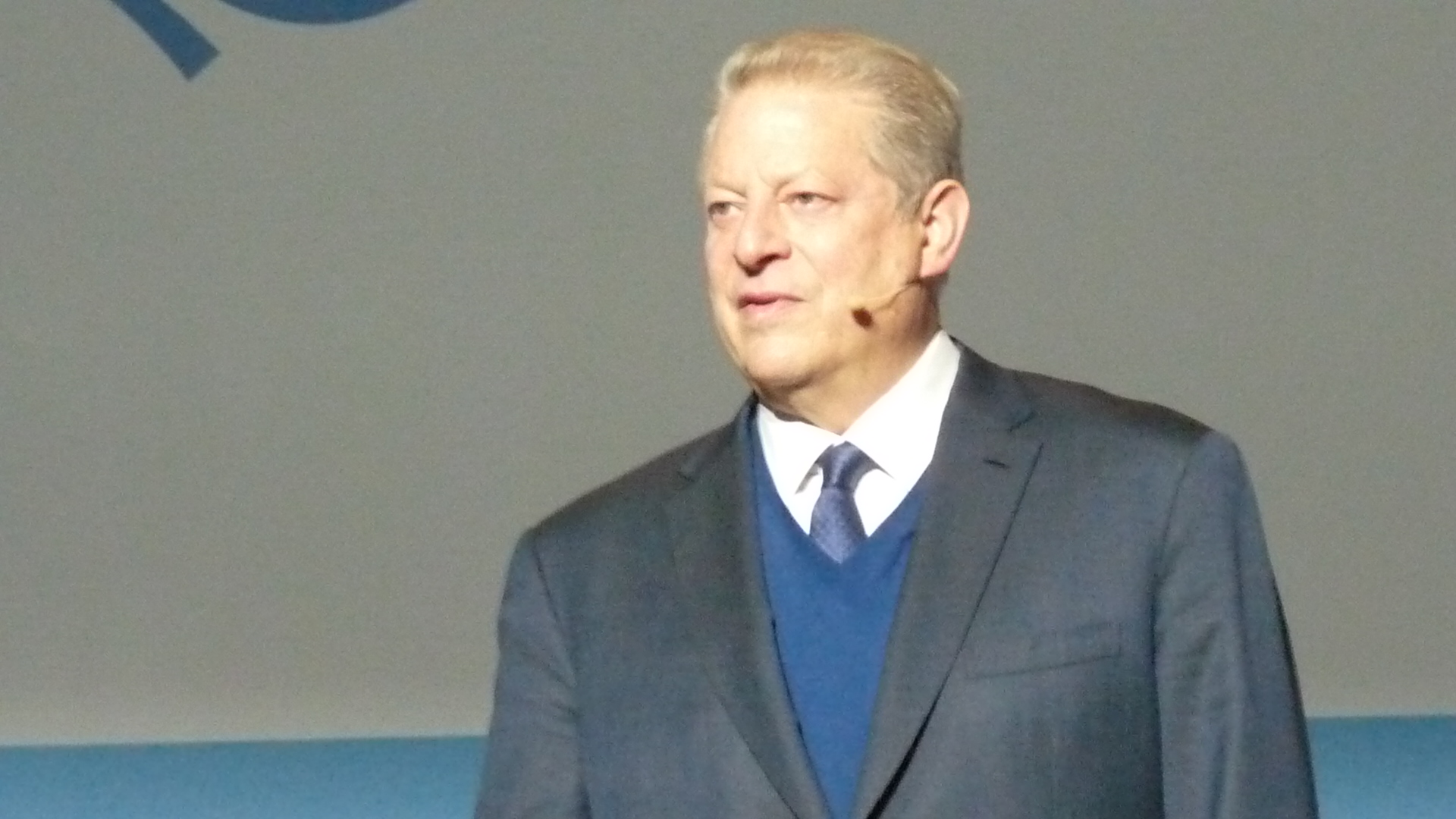
Gore for president?
There was an audible thrill – as well as loud applause – that went through a packed crowd when, during a section of his presentation, Al Gore finally mentioned President Trump’s name, saying: “If there’s a new president, and excuse me for a minute…”
Was this Gore pitching for the presidency? He was discussing the fact Trump’s stated desire to withdraw from the Paris climate change agreement would be thwarted if a new president is elected when his first term comes to end, because of the notice period needed to withdraw.
“He could simply give 30 days’ notice and the U.S. could be right back in again,” added Mr. Gore of any new administration.
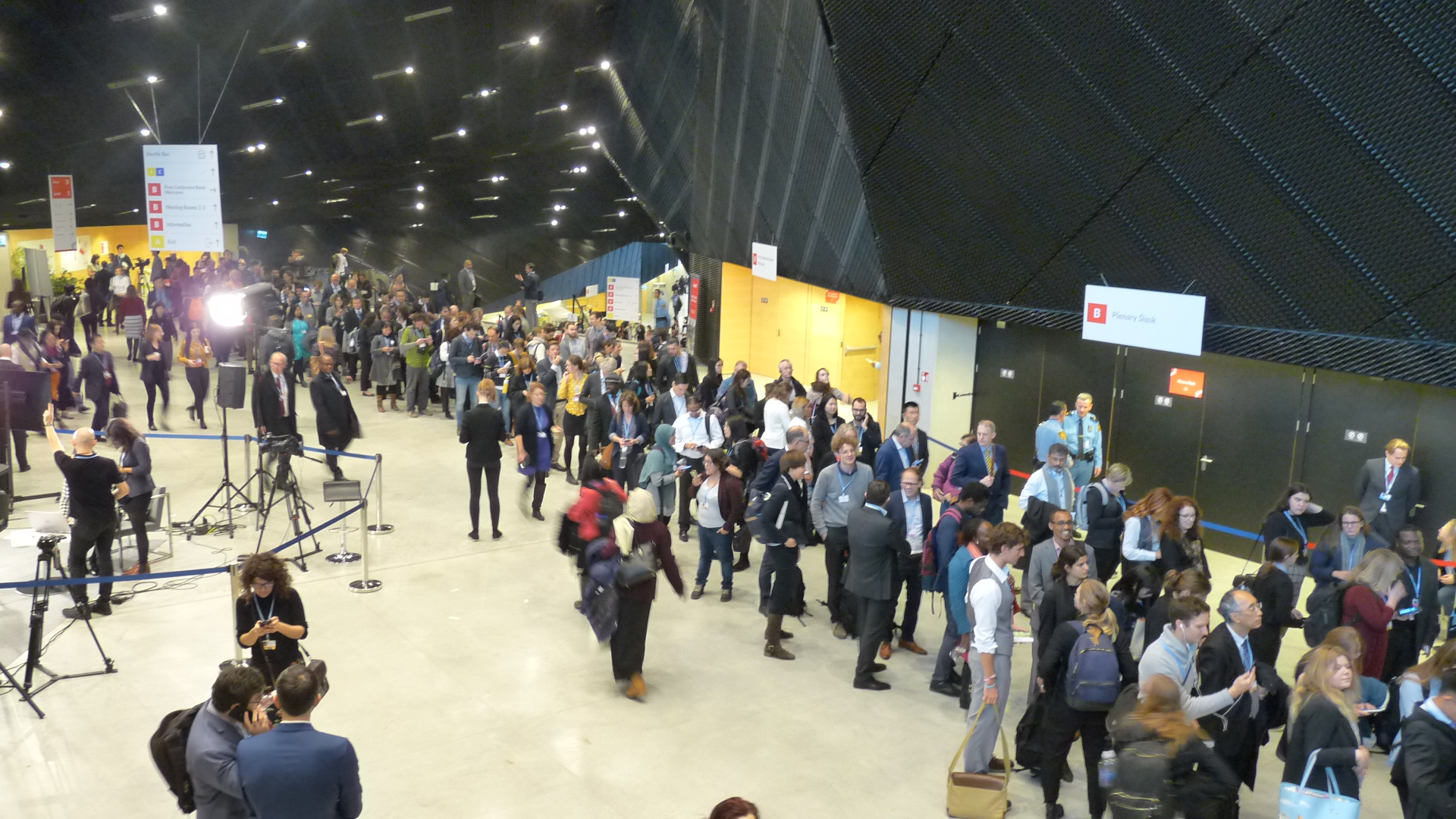
An inconvenient queue
It seems Al Gore is quite the draw. I haven’t seen a queue that long her since I had to register on Monday.
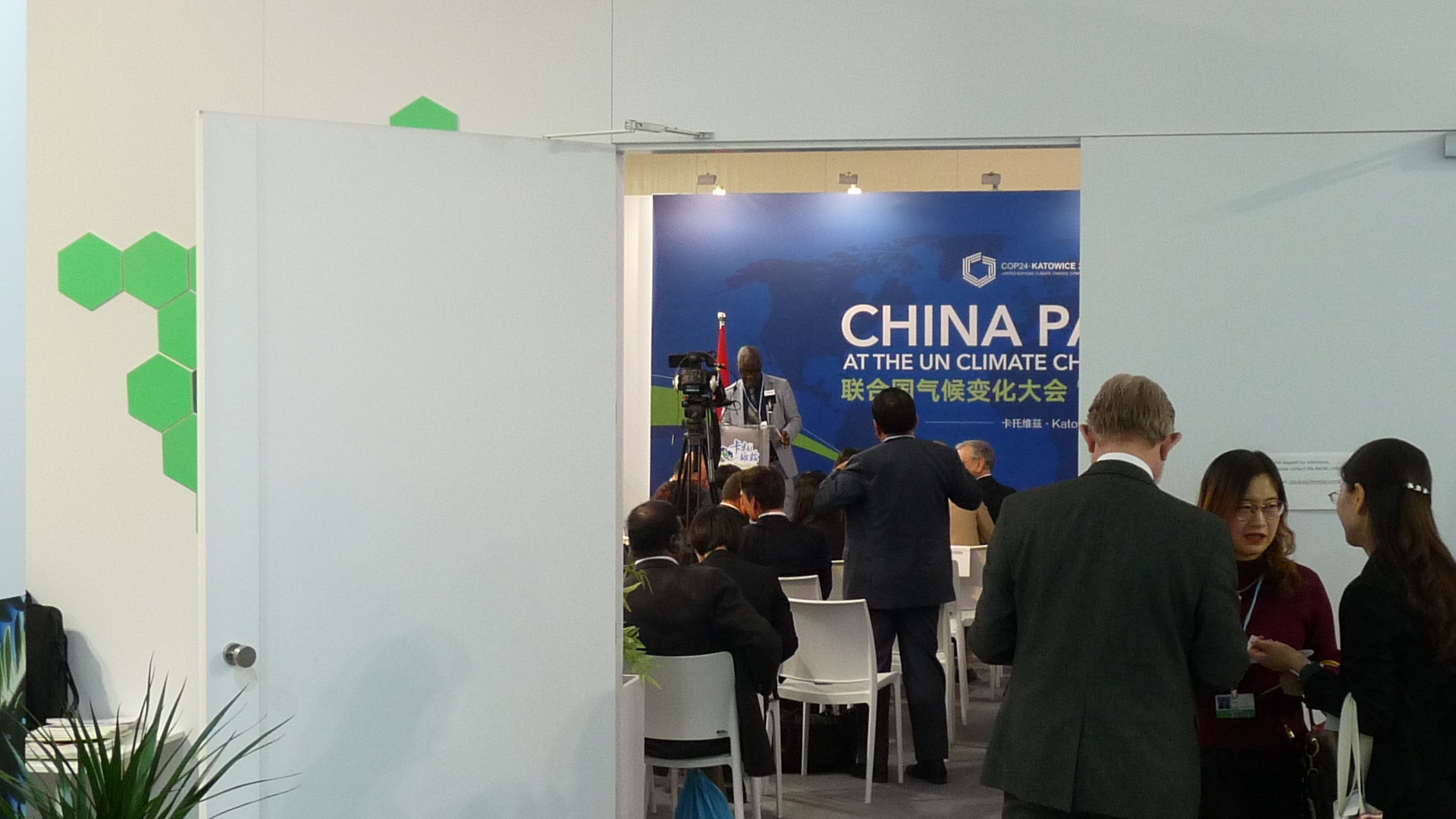
What the Wifi!
It’s interesting to note that the venue’s free wifi fails completely inside the China pavilion but as son as you carry a laptop five yards to the next-door Green Climate Fund rest area, there is full coverage. I wonder if they have a blocker on.
According to the program, Al Gore is due up in 20 minutes or so and I’m going to try and track down the venue now, as that is sure to be a big draw.
I did some asking around and it appears this morning’s business non-event had been signed correctly, it just never took place, with one of the organizers here saying she didn’t know why. but perhaps it was because not enough people turned up.
It appears nobody hear, at least, wants to hear the thoughts of business on the COP24 – or maybe no businesses cared to share their views of what’s going down in Katowice
China calling
I’ve drifted to the China pavilion, where the topic for discussion is South-South Co-operation – a movement which is generally regarded to have started at the Asian-African conference in Indonesia in 1955 to encourage work among the world’s developing countries.
Of course nowadays China is able to fill the void left by the retreat of the U.S. from global politics, with initiatives such as its One Belt, One Road initiative.
We've just heard from Egyptian Environment Minister Yasmine Foad about the importance of engaging youth in combating climate change, and how the Egyptian government of Abdel al-Sisi is working with youths across the nation’s governorates.
It is interesting to see that South-South Co-operation messaging is also prominent in the nearby Pacific pavilion too, it seems like there’s a big push on this.
One member of the Chinese government has just touched on the One Belt, One Road initiative by saying: “I think actions against climate change should not be made at others’ request but at our own initiative. But at the same time we should also consider our own needs and opportunities. Through the South-South Co-operation we’re going to set an example for the global community.”
Another Chinese speaker (I’m sorry, there is no list of speakers available) has just not-so-veiled swipe at President Trump by pointing to the lack of consensus for fighting climate change.
He said: “Planet Earth is our common home, no-one can escape from climate change, no matter it’s a developed or developing country.
“Some countries may withdraw from the Paris agreement – I don’t think it’s a really good idea.”
As a caveat I should point out, I am hearing this through a translator, so it is unclear whether the speaker’s remarks were more condemnatory than that.
The diametric opposite of the concerns of business
On a separate note, one of the few journalists who has started to file in to the Katowice press conference room has informed me – as does the screen at the front now – that this room is hosting a presentation on ‘NDCs, SR1.5, Cryosphere’. It appears the big screen that advertises a selection of the day’s events near the main entrance has sold me a lollipop.
The cryosphere (as I’m sure all our readers know, and I'm just now discovering, is the two poles). It’s a worthy topic and the problem facing me is this: This is a huge press conference room without about half a dozen journalists in it and I will feel really self conscious vacating now we're five minutes in.
The things I do for pv magazine. And I'd just like to state here, for the record, that I do care about the cryosphere. Which, by the sounds of it, may not be here for too much longer.
The state of play
There’s still comically little sign of activity here in the business press conference so there’s time to enlarge upon that change in atmosphere that was detectable yesterday.
Most of the politicians that must actually agree to set in place a timetable to contain climate change to no more than 1.5C are now here in Poland – although Theresa May is putting a spoke in the wheel for the EU by distracting heads of state with her Brexit contortions.
The word is, everyone present wants to adopt the recommendations of the recent IPCC report that says we’re going to hell in a handcart if we don’t sort things out by 2030. There are four dissenters, all of them oil rich. Saudi – who we heard from two days ago quibbling about the confusion between development and climate funding and appearing to press the case that they should be a recipient nation of the latter – and Kuwait merely want to note the IPCC findings.
That stance is shared by Russia and the U.S. in yet another example of the good work Donald Trump is achieving by uniting the two formerly implacable foes.
There were strong words at yesterday’s high level meeting (pv magazine was too sluggish to win one of the limited number of golden press tickets to that one) from UN climate chief Patricia Espinosa, who said: “Many political divisions remain. Many issues still must be overcome. But I believe it’s within our grasp to finish the job. Let’s complete the Paris Agreement work program and, by doing so, immediately unleash the power of the Paris agreement itself.”
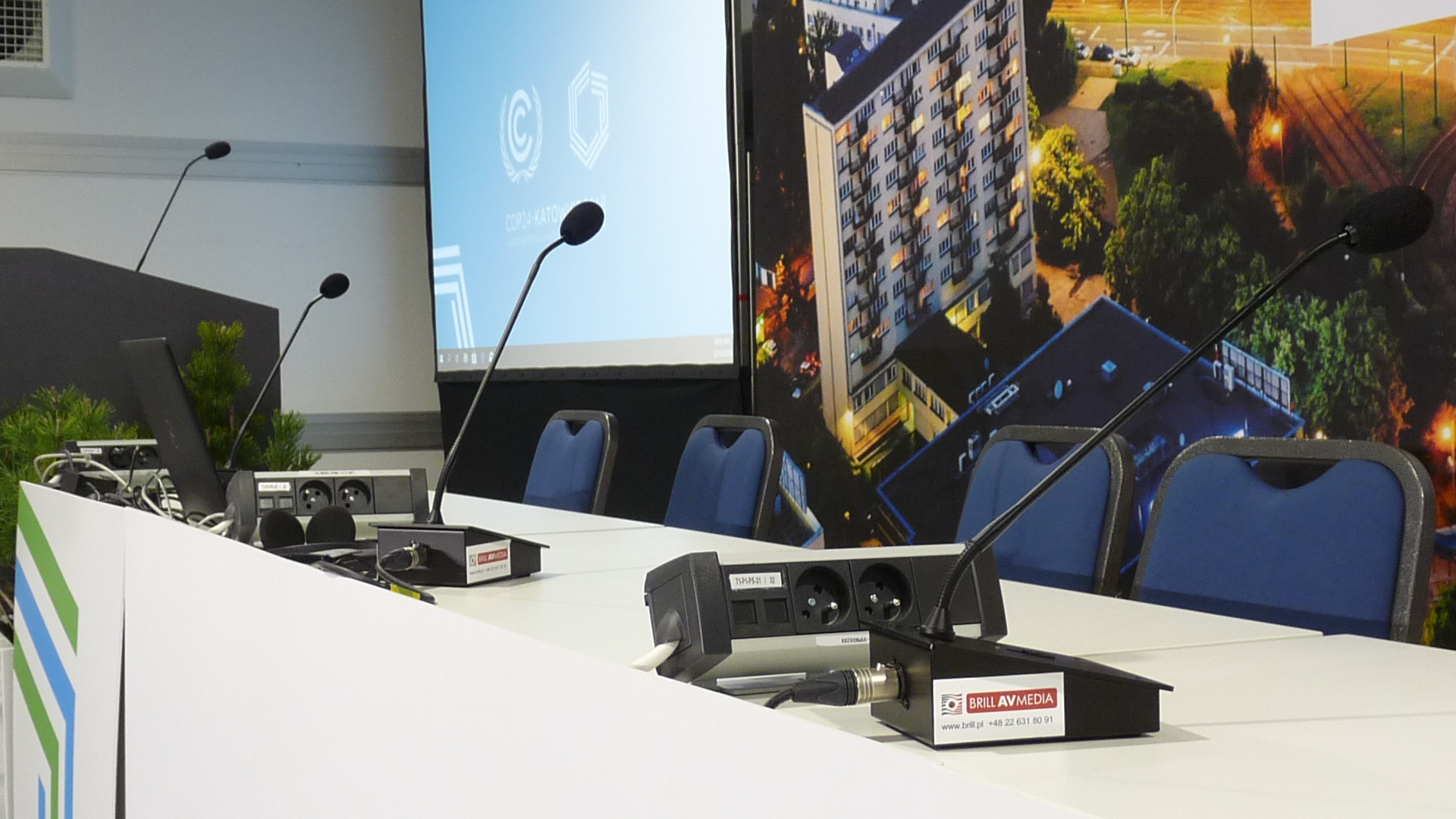
Here we go again
Good morning readers, are you ready for another day of climate change related goings on?
There was a barely noticeable, but nevertheless discernable uptick in urgency yesterday, as we entered day two of the second week of COP24 here in Katowice, let’s see what today brings.
My tentative plan is to try and see climate hero Al Gore at around 11am, and then it will be interesting to hear the EU’s take on carbon pricing, given the events in Paris. That’s set for 12.30-2pm.
There is a solar cooking press conference on the menu at 2pm, and I'm planning to kick off with a session about how business reacts to COP24 although, as you can see, the answer appears to be rather sluggishly, given this particular do was supposed to start 15 minutes ago.
Maybe there’s a clumsy metaphor in there somewhere.
